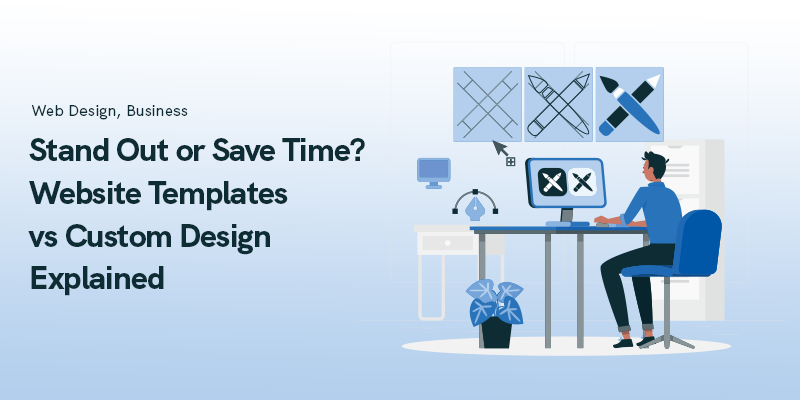
Stand Out or Save Time? Website Templates vs Custom Design Explained
In the digital age, a compelling online presence is more crucial than ever.
Whether you're a budding entrepreneur or an established business, the question of how to effectively represent your brand online often boils down to a pivotal decision: should you opt for a website template or invest in custom design?
This choice not only impacts how your website looks and functions but also dictates the trajectory of your brand’s digital footprint.
Choosing between website templates and custom design is not just a matter of aesthetics; it's about aligning your online identity with your business goals.
Do you prioritize standing out with a unique design, or is getting your site up quickly and efficiently more critical?
In this detailed exploration, we'll delve into “website templates vs custom design,” offering insights and real-world advice to help you make an informed decision that could define the future of your online presence.
Join me as we unpack the pros and cons, the subtle nuances, and the bottom-line impacts of each option, ensuring you choose wisely in the battle of customization versus convenience.
What Is Custom Web Design?
Custom web design is much like commissioning a tailor-made suit. It involves crafting a website uniquely designed to meet the specific needs and branding of your business. Unlike off-the-rack website templates, a custom web design is conceptualized from scratch, with no predefined boxes to tick.
It's built to ensure that every pixel reflects your brand's ethos and objectives, providing a distinctive online presence that can capture and retain the attention of your target audience.
The process of building a custom website typically involves a detailed analysis of your business goals, target audience, and desired user experience. This bespoke approach means that every element, from the layout to the functionality, is tailored to enhance the way your brand interacts with its customers online.
Whether it's integrating unique features, optimizing the site for mobile devices, or ensuring that the navigation is intuitively aligned with user behaviors, custom web design is all about creating a seamless and engaging user experience that stands out in a crowded digital landscape.
The advantages of going custom are clear. You get a site that is custom-built to your specifications, which can significantly boost your brand's credibility and competitive edge. This tailored approach also allows for greater flexibility in terms of scalability and future updates.
As your business evolves, so too can your website, adapting to new website design trends and customer expectations without the constraints often imposed by pre-designed templates.
However, the journey to a custom-designed website is not without its challenges. It requires a significant investment of time and resources, often involving a team of skilled designers, developers, and content creators to bring your vision to life.
The bottom line?
If standing out in the digital realm and building a custom site that fully encapsulates your brand is a priority, then custom web design might just be the perfect fit.
Pros of Custom Web Design
Transitioning from the general concept of custom web design, let's delve into the tangible benefits that such an approach offers.
Choosing a custom-designed website not only elevates your brand but also aligns with strategic business objectives in ways that pre-designed templates simply cannot match.
Let’s have a look at the key advantages that underscore why a custom approach might be the right investment for your online presence:
- Unique Brand Identity: Custom web design crafts a digital space that's a true reflection of your brand's personality and message. This uniqueness is something a template, which might be shared by thousands of other sites, cannot offer.
- Enhanced User Experience (UX): Tailoring your site’s layout and functionalities to meet the specific needs of your users ensures a more intuitive and engaging experience, which can lead to increased user satisfaction and higher conversion rates.
- Scalability and Flexibility: Custom sites are engineered to grow along with your business, making it easier to add new features and functionalities as your needs evolve, without the constraints typical of templates.
- Search Engine Optimization (SEO) Benefits: A custom design facilitates cleaner code and a more streamlined website structure, enhancing your site’s SEO potential and boosting its visibility in search engine results.
- Better Security: Opting for custom design allows you to implement robust security measures tailored to your specific requirements, helping protect your site and user data from cyber threats.
- No Limitations on Creativity: The freedom of custom design means you can implement any visual and functional elements you envision, from bespoke animations to unique layout features, setting your site apart from the competition.
- Improved Conversion Rates: A strategically designed custom website can more effectively guide visitors towards desired actions, such as purchases or sign-ups, thereby enhancing overall conversion rates.
- Ownership and Control: With a custom website, you maintain full ownership and control over every aspect—design, code, and content—allowing for updates and changes as needed without dependency on template restrictions or third-party platforms.
Each of these advantages plays a crucial role in not just defining the online presence of a brand, but in amplifying its reach and resonance with its intended audience. By investing in custom web design, you're not just building a site; you're crafting an expansive, adaptable digital ecosystem.
Cons of Custom Website Design
While the benefits of custom web design are compelling, it's equally important to consider the potential drawbacks that might influence your decision.
This balanced approach helps ensure that you choose a website solution that truly aligns with your business needs and budget constraints.
Here are the main disadvantages associated with custom web design:
- Higher Initial Costs: Custom web design typically involves a higher upfront investment compared to using pre-made templates. This is due to the extensive design and development work required to create a unique and fully functional site from scratch.
- Longer Development Time: The process of building a custom website can be time-consuming. From the initial design phase to development and testing, creating a bespoke website often takes significantly longer than deploying a template-based site.
- Requires a Skilled Team: To achieve a high-quality custom website, you need to hire experienced designers, developers, and project managers. Finding and retaining such a team can be a challenge, especially if you require specialists in the latest web technologies.
- Ongoing Maintenance: Custom websites may require regular updates and maintenance to ensure they continue to function correctly and remain secure against new threats. This can add to the long-term costs of owning a custom site.
- Potential Over-Complexity: Sometimes, in the quest to stand out, custom websites can become overly complex. This might affect the site’s usability, performance, and ultimately, the user experience.
- Cost Variability in Major Cities: If you are considering working with an agency, especially in a major urban center like New York, the costs can be substantially higher. For businesses looking to make a mark with their online presence in competitive markets, the investment in website design in New York can be considerable but necessary to achieve the desired level of differentiation and quality.
Understanding these challenges is crucial in weighing whether the investment in custom web design is the right move for your business, particularly when balancing short-term impacts and long-term gains.
What is a Website Template?
Enhancing our understanding of website templates, it's crucial to consider the role of content management systems (CMS) and plugins, which significantly augment the functionality and flexibility of these templates.
A CMS like WordPress or Joomla allows users to manage and update their websites with ease, offering a user-friendly interface where they can modify content, add pages, and install plugins that extend the capabilities of the website.
Plugins are tools that can be added to a template to introduce new features or improve existing functionalities.
For instance, eCommerce plugins can transform a basic website into a fully functional online store, while SEO plugins can help optimize your site for search engines, enhancing your online visibility.
The integration of these tools means that even a standard template can be tailored to meet more complex needs and specific functionalities.
With the use of a CMS and the strategic application of plugins, website templates become not only a foundation but a versatile framework capable of supporting a wide array of business needs.
This adaptability makes them an even more appealing choice for businesses and individuals looking to establish a robust online presence quickly and efficiently, all while keeping budget constraints in check.
Whether you're launching a blog, building a corporate site, or setting up an online store, the combination of a reliable template, a powerful CMS, and the right plugins can dramatically expedite and enhance your web development process.
Pros of Using Website Templates
Choosing a website template offers several advantages, especially for businesses looking to establish an online presence quickly and efficiently. Here are some of the key benefits:
- Cost-Effective: Website templates are generally much more affordable than custom designs. This cost-effectiveness makes them an excellent option for startups, small businesses, or anyone on a tight budget who still wants to look polished and professional online.
- Quick Setup: With templates, the design work is already done. You simply need to add your own content and adjust the settings according to your needs. This can significantly speed up the launch of your website, allowing you to go live in days rather than weeks or months.
- Ease of Use: Most website templates are designed with user-friendliness in mind. They often come with built-in content management systems that make it easy for anyone, regardless of technical expertise, to update and manage their website.
- Professional Design: Templates are created by professional designers and follow the latest web design trends, ensuring your website looks modern and functions smoothly. This professional appearance can enhance your credibility and appeal to your audience.
- Reliability: Since website templates are used by many, they are regularly updated and tested for bugs and compatibility issues. This ongoing support can provide peace of mind, knowing that your website operates smoothly on all current browsers and devices.
- Built-In Features: Many templates come packed with advanced features like SEO tools, social media integration, and e-commerce functionalities, which can be costly and complex to develop from scratch.
- Consistency: Templates provide a consistent structure and design, which can help maintain a cohesive user experience as visitors navigate through your website.
These advantages make website templates a compelling choice for individuals and organizations looking to create a robust online presence without the complexities and costs associated with custom web design.
Cons of Website Templates
While website templates offer numerous benefits, particularly in terms of cost and speed, there are also some limitations that might influence your decision depending on your specific needs and ambitions for your website.
Understanding these drawbacks is essential to ensure that the choice you make aligns well with your long-term goals for your digital presence. Here are some notable cons associated with using website templates:
- Limited Customization: Templates offer less flexibility in design and functionality. You are often confined to a certain layout and design elements, which can hinder your ability to create a truly unique website that stands out from competitors.
- Commonality: Since templates are readily available and used by many, there's a high chance that other websites, possibly including your competitors, will look quite similar to yours. This can dilute your brand's identity and impact.
- Bloated Code: Some templates come with a lot of built-in features, not all of which you may need. This can lead to bloated code that may slow down your website, negatively affecting user experience and SEO.
- Dependency on Template Provider: Your website's future updates and compatibility with new web technologies will depend on the template provider's commitment to regular updates. If they discontinue the template or fail to update it, you might need to overhaul your site sooner than anticipated.
- SEO Limitations: Templates are not always optimized for SEO. Customizations to improve SEO can be limited, which might require additional plugins or tools, complicating your site further.
- Potential for Security Vulnerabilities: Popular templates can be targets for hackers. If security patches are not regularly provided by the template developers, your site may be at risk.
These factors highlight the importance of carefully considering how a template-based approach to your website might align with your specific needs and long-term online strategy.
Website Templates vs Custom Design : Which Is Better for Your Business?
Deciding between website templates and custom design hinges on the specific needs, budget, and long-term goals of your business.
Each approach offers distinct benefits and comes with its limitations, shaping the digital presence of your brand in different ways.
Choosing the Right Option: Templates vs. Custom Design
Opt for Custom Design When:
Custom design is best for businesses that prioritize a unique brand identity and require specific functionalities that go beyond what templates can offer.
This approach is especially suitable for larger companies or those with plans to scale, as it provides the flexibility needed for growth and integration.
Custom design enhances user engagement through tailored user experiences and can also be optimized for better SEO performance, offering a stronger foundation for online visibility.
Choose a Template for:
Templates are ideal for startups, small businesses, or any organization needing to quickly establish an online presence without significant costs.
Modern templates offer enough flexibility and sophistication to create professional and functional websites that meet general business needs effectively.
They are also a practical choice for testing new business ideas or for businesses with straightforward models, allowing for rapid deployment and lower financial risk.
Expert Recommendation:
In the debate of website templates vs custom design, a strategic decision should consider the specific context of the business. For entities facing high competition or those in niche markets, the unique features of a custom design might provide a necessary edge.
Conversely, for businesses prioritizing speed and cost-efficiency, or those at a nascent stage, templates offer a valuable and practical solution.
The key is to align the choice with the business’s immediate needs and future growth plans, ensuring the digital strategy supports and enhances the brand’s trajectory in the online world.
Recommended Posts

12 Best Google Chrome Screenshot Extensions for 2025
July 30, 2024

10 Best Web3 Design Agencies in 2025
July 30, 2024

Understanding Website Content Security Policy in 2024
January 10, 2024
